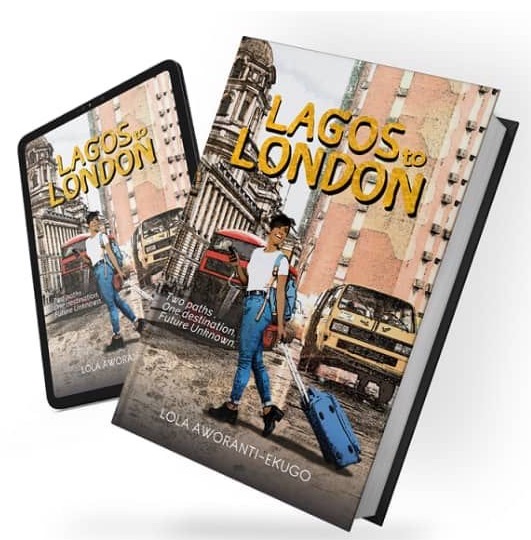
The acclaimed American writer, Mark Twain, said that “Education consists mainly in what we have unlearned.”
Lagos to London is the debut book by Lola Aworanti-Ekugo. It tells the story of two young people who embark on a journey to “get an education“, but who gain so much more. Going abroad to study is something that generations of Nigerians have been doing or have aspired to do. Some go with the aim of settling in foreign shores. However, some go for the sole aim to acquire an education and new experiences before returning home.
Over the last decade, there has been a mass exodus of young people who are looking for a better quality of life, more secure and stable conditions and more options for their children. Most of these young people plan never to return to Nigeria.
Lagos to London tells the story of Remi Coker – a lady from a well-to-do Lagos family – and Nnamdi Okonkwo – a young man from a family who has experienced the vicissitudes of life, starting from a comfortable middle class life in a well-heeled part of Lagos and ending-up in a rougher part of the city.
Remi’s parents are both lawyers and run a law firm that she is expected to work in and run one day. Her parents exemplify the typical ambitious upper-class family, who (with the best of intentions) end-up pushing their children to achieve and do more. With Remi, they push her onto a path that she would would not have chosen for herself. Boxed into a corner, Remi finds herself taking-up university admission in London to study Law, a course that she is ambivalent about.
Like so many young people of that age, Remi is not quite sure what she wants to do with her life, but is almost certain that law isn’t it. Again, like so many young people, Remi has a talent that she has received numerous compliments about, but which she has disregarded because it’s not a “practical choice”.
I can relate to this, because at about the same age as Remi – like countless Nigerian secondary school students – I had to make a choice about what I wanted to do for the rest of my life. I also made my career decisions initially based on what I considered to be a “smart, sensible and acceptable” reasons. Like Remi, I ignored my natural strengths and abilities and this soon had very dramatic repercussions and I was forced to face-up to the fact that the career path I had chosen might not be the one that best suited my talents.
On the other side of the tracks, we have Nnamdi – a young, driven man, who knows to the tee the type of life he wants for himself. He knows that he wants to be a man who is in charge of his destiny and not capitulating to defeat, in the way he considers his father has.
As he also moves to London for his university education, he is motivated by a sole desire to become a British citizen and create a better life for himself and his family. This leads him towards a path that threatens to compromise his values.
Nnamdi’s dilemma perfectly epitomises todays’s “japa” culture, where young people want to leave Nigeria at all costs to carve a better life for themselves somewhere else. Nnamdi’s path raises the questions:
- How high a price are we willing to pay to achieve that golden fleece abroad?
- Are we willing to lower our standards to do this?
- Or are we willing to find a way that is in line with the law and our standards, even though it is a longer journey?
These are the questions that all intending emigres must ask themselves.
Lagos to London presents an alternative to the “abroad is the Mecca” thinking: one where returning to Nigeria is an acceptable option after getting the degrees and experience overseas.
This particular option of returning to Nigeria – especially in today’s economic and political climate – is an unpopular and rare one among young Nigerians, after “who patriotism help?”
But Lagos to London shows how choosing to make one’s life overseas and returning to Nigeria are both perfectly viable options – depending on what one wants from life.
I enjoyed this book immensely on so many levels. Firstly, on the level of someone who started off being confused about her future career path, but who gradually found her way into a fulfilling career and enjoyable life. Secondly, on the level of someone who spent over a decade studying and working abroad and who chose to return to Nigeria. And finally, on the level of someone who enjoys a well-written and engaging book.
I know for sure that many other readers – especially young people and people who are at a crossroads of deciding what type of life they want for themselves – will get so much out of this book.
Lagos to London shares many valuable lessons and food for thought, for example, the power of intention and of deliberately designing your life. However, Lagos to London is not a preachy book.
Lola Aworanti-Ekugo’s prose is crisp and inviting. She keeps the story moving along nicely, while deftly painting the characters and the world in which they live in, so that Remi and Nnamdi feel like friends, whose lives you have a front-seat view of. The characters are well-drawn out and relatable in all their three-dimensional glory. We see each character for who they are – warts and all; strengths and all.
Lola Aworanti-Ekugo also has a fantastic ear for dialogue, which helps to anchor the plot across the various geographic and socioeconomic backdrops that the story travels through. You know who these people are, where they come from and what drives them. In some cases, you might even BE them.
And for these reasons, I think Lagos to London is a must-read. You won’t read it once and put it away. The characters and their circumstances will stay with you and you will find yourself picking it up, again and again, drawing wisdom and insight from it.

Recent Comments